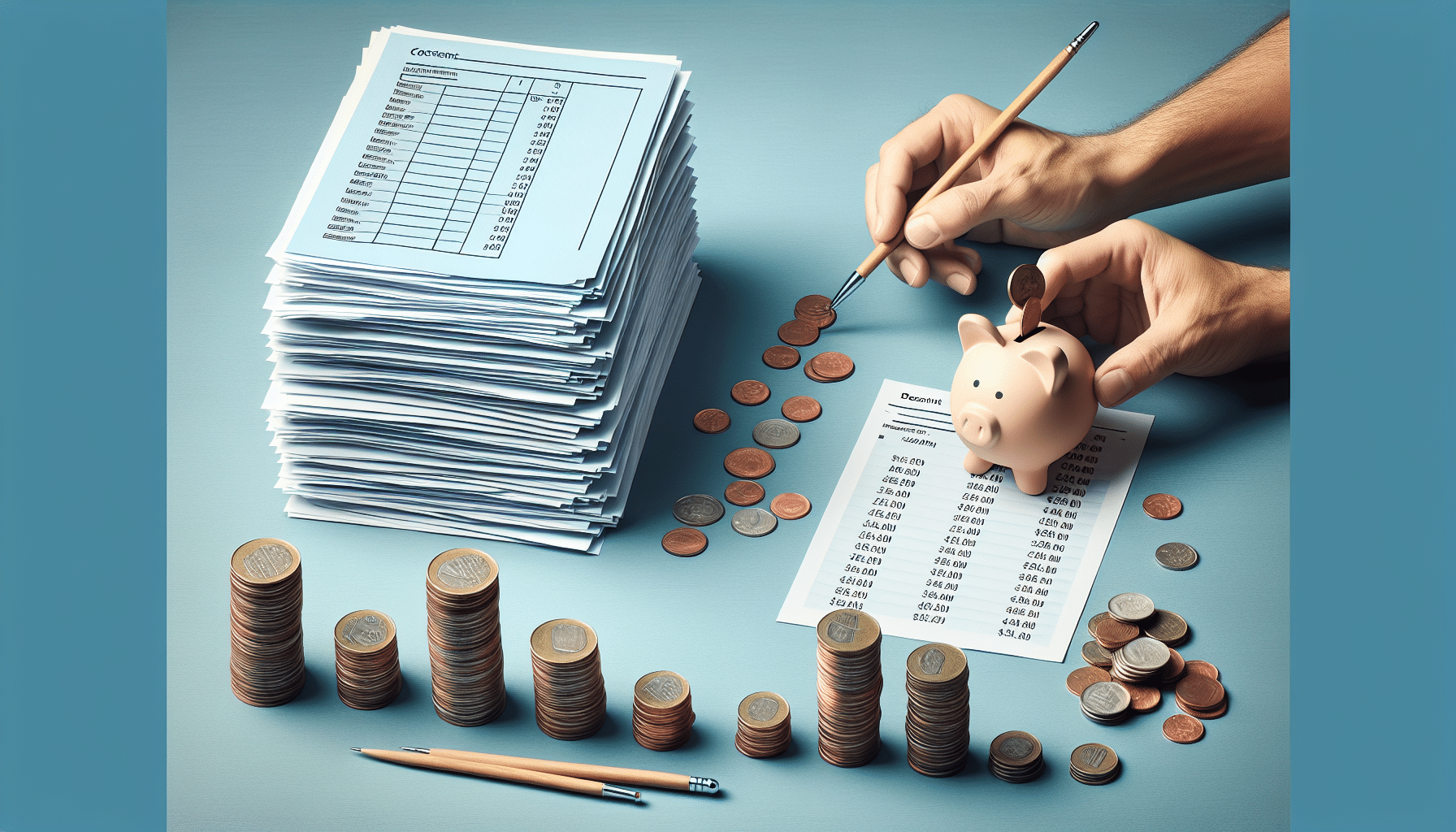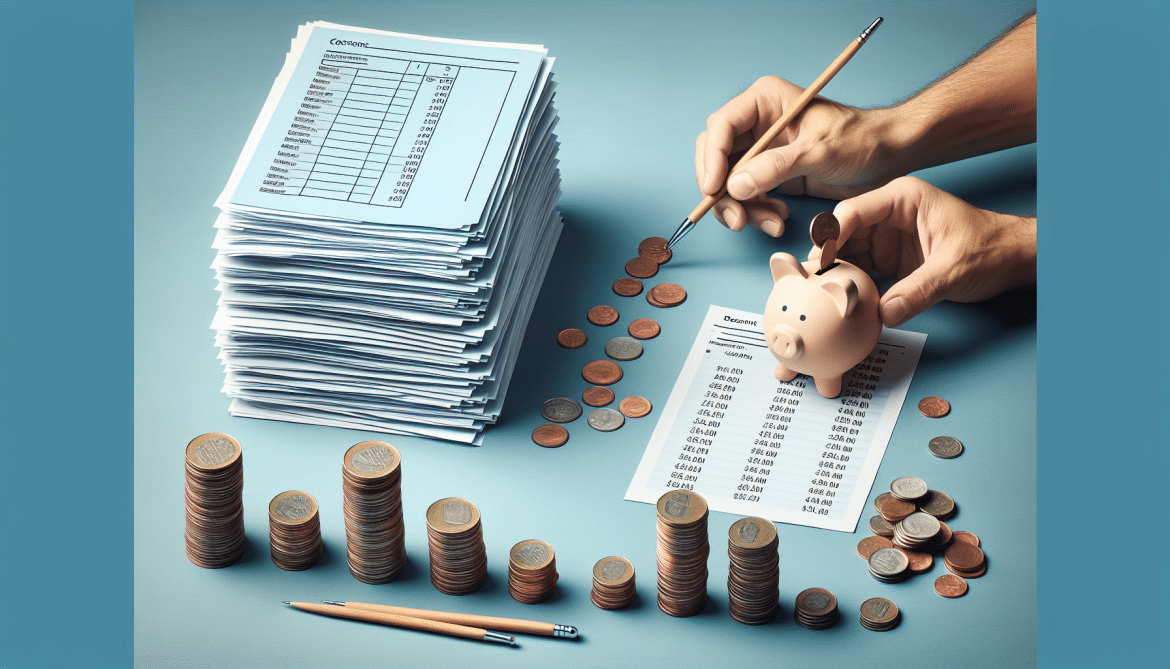If you find yourself behind on bills, don't worry - you're not alone. With total household debt surpassing $15 trillion in 2021, many people face the challenge of catching up on their bills. But fear not, because we've got you covered with a step-by-step guide on how to get back on track. The first order of business is to get organized by creating a comprehensive list of all your bills and their due dates. From there, you can evaluate your finances and determine which expenses are essential versus non-essential. Next, reach out to your creditors to cancel any unnecessary services and negotiate bills for better prices or payment plans. Additionally, consider comparison shopping to find companies that offer better prices for services like cell phone plans. Finding ways to earn extra income can also help, whether it's asking for a raise, selling unwanted items, or starting a side hustle. Lastly, create a plan to catch up on bills by budgeting, automating payments, and prioritizing debt repayment. With the right organization, evaluation, negotiation, and financial planning, it is possible to regain control of your bills and improve your financial well-being.

This image is property of pixabay.com.
Step 1: Organize Your Bills
Being behind on bills is a common problem, with total household debt reaching over $15 trillion in 2021. To catch up and regain control of your finances, the first step is to get organized. Start by creating a comprehensive list of all your bills, including credit card payments, mortgage or rent, utilities, insurance premiums, and any other recurring expenses. Make sure to note down their respective due dates as well. By having a clear overview of your financial obligations, you will be better prepared to tackle them systematically.
Step 2: Evaluate Your Finances
Once you have organized your bills, it's time to evaluate your overall financial situation. This step involves differentiating between essential and non-essential expenses. Essential expenses are those necessary for basic living needs, like housing, food, transportation, and healthcare. Non-essential expenses, on the other hand, are discretionary and can be reduced or eliminated to free up more funds for bill payments.
Take a close look at your non-essential expenses and identify areas where you can cut down. This may include dining out less frequently, reducing entertainment subscriptions, or finding more affordable alternatives for certain services. By making these adjustments, you can redirect those savings towards catching up on your bills. Additionally, prioritize your bill payments based on urgency and importance. Ensure that you allocate your available funds towards the bills with the nearest due dates.

This image is property of pixabay.com.
Step 3: Call Creditors
Don't be afraid to reach out to your creditors for assistance. They may be able to help you lower your bills or offer more manageable payment plans. Start by canceling any unnecessary services or subscriptions that you can do without. This will immediately reduce your financial burden. Then, contact your remaining creditors and explain your situation. They may be willing to negotiate better prices or accommodate temporary hardship arrangements.
When negotiating with creditors, remember to be polite and provide relevant information about your financial difficulties. It's important to approach the conversation with an open mind and be willing to compromise. Sometimes, creditors understand that it's better to receive partial payments than none at all. By proactively engaging with your creditors, you can find solutions that work for both parties involved.
Step 4: Comparison Shopping
Another effective way to catch up on bills is to research and compare companies that offer better prices for the services you need. This is especially true for expenses like cell phone plans, internet providers, and insurance premiums. Take the time to explore alternative options and check if switching to a different provider can result in significant cost savings.
Comparison shopping allows you to make informed decisions about your expenses and ensures that you are getting the best value for your money. Keep in mind that the goal is to reduce your monthly bills so that you can allocate more funds towards catching up on any outstanding payments.

This image is property of pixabay.com.
Step 5: Seek Additional Income
Earning extra income can greatly assist you in catching up on bills. Consider different avenues where you can increase your earning potential. Start by asking for a raise or promotion at your current job. Highlight your contributions and the value you bring to the organization. If a raise is not possible at the moment, explore the possibility of taking on additional responsibilities or projects that offer extra compensation.
Another option is to sell unwanted items that are in good condition. Look around your home and identify items that you no longer need or use. Websites and platforms like eBay, Facebook Marketplace, or local classifieds can help you connect with potential buyers and turn your unused belongings into cash.
If selling items is not feasible, you can also start a side hustle. Consider your skills, interests, and passions and explore opportunities to monetize them. Whether it's offering freelance services, tutoring, pet sitting, or starting an online business, there are countless possibilities to earn additional income outside of your primary job.
Step 6: Create a Catch-up Plan
To effectively catch up on bills, it's crucial to create a comprehensive catch-up plan. Start by developing a realistic budget that reflects your income, expenses, and debt obligations. This will help you gain a clear understanding of your financial situation and enable you to make informed decisions.
Allocate funds specifically for bill payments within your budget. Prioritize these payments, ensuring that they are given the highest priority. Consider automating bill payments if possible, as this can help ensure that payments are not overlooked and that they are made on time.
As you work towards catching up on bills, consider paying off debts strategically. Focus on paying down high-interest debts first, as they can accumulate quickly and cause additional financial strain. Make minimum payments on other debts while you concentrate on eliminating the high-interest ones. Once those are paid off, you can allocate more funds towards the remaining debts.

Step 7: Seek Financial Assistance
If you find yourself in a dire financial situation, do not hesitate to seek financial assistance. There are various programs and resources available to help individuals facing financial hardships. Start by exploring government assistance programs that may provide temporary relief or financial support. These programs can include unemployment benefits, food assistance, or housing assistance, depending on your specific circumstances.
Additionally, consider reaching out to local financial resources, such as community organizations, charities, or religious institutions. These organizations often have programs or funds specifically designed to assist individuals and families in need. They may offer financial counseling, emergency aid, or access to resources that can help you regain stability.
Nonprofit organizations dedicated to assisting individuals in financial distress can also be a valuable resource. They may provide financial education, debt management programs, or even grants to help alleviate some of your financial burden. Research and reach out to these organizations to see if they have any services that can support your situation.
Step 8: Communicate with Creditors
Open and honest communication with your creditors is essential during this process. If you're experiencing difficulty in meeting your payment obligations, it's crucial to inform your creditors about your financial situation proactively. By doing so, you're showing them that you are committed to resolving your debts and are actively seeking solutions.
When speaking with your creditors, explain your current financial difficulties and present any documentation or evidence that supports your situation. Request temporary hardship arrangements, such as a reduced payment plan or an extended due date, that can help you manage your bills more effectively. Many creditors are willing to work with you to find a solution that enables them to get paid and ensures you can catch up on your bills.

Step 9: Prioritize Bill Payments
As you catch up on bills, it's essential to prioritize your payments based on due dates and importance. Start by paying off the bills with the nearest due dates to avoid any late fees or penalties. Next, focus on high-priority bills such as rent or mortgage payments, utilities, and insurance premiums. These are crucial for maintaining essential services and avoiding further financial difficulties.
For bills where catching up entirely may not be feasible immediately, consider making minimum payments to avoid falling further behind. While it's ideal to pay off debts in full, maintaining minimum payments will help prevent additional penalties or damage to your credit score. Ensure that you communicate with your creditors about your payment strategy and keep them informed if circumstances change.
Conclusion
Catching up on bills may seem overwhelming, but with proper organization, evaluation, negotiation, and financial planning, it is possible. Start by organizing your bills and evaluating your finances to identify areas where you can make adjustments. Contact your creditors to explore options for reducing bills or arranging manageable payment plans. Consider comparison shopping for better-priced services and explore ways to increase your income. Create a catch-up plan by developing a budget, automating bill payments, and strategically paying off debts.
If necessary, seek financial assistance from government programs, local resources, or nonprofit organizations. Communicate openly with your creditors and prioritize bill payments based on due dates and importance. With dedication and persistence, you can regain control of your financial situation and catch up on bills, setting yourself on the path to a more stable and secure future.

